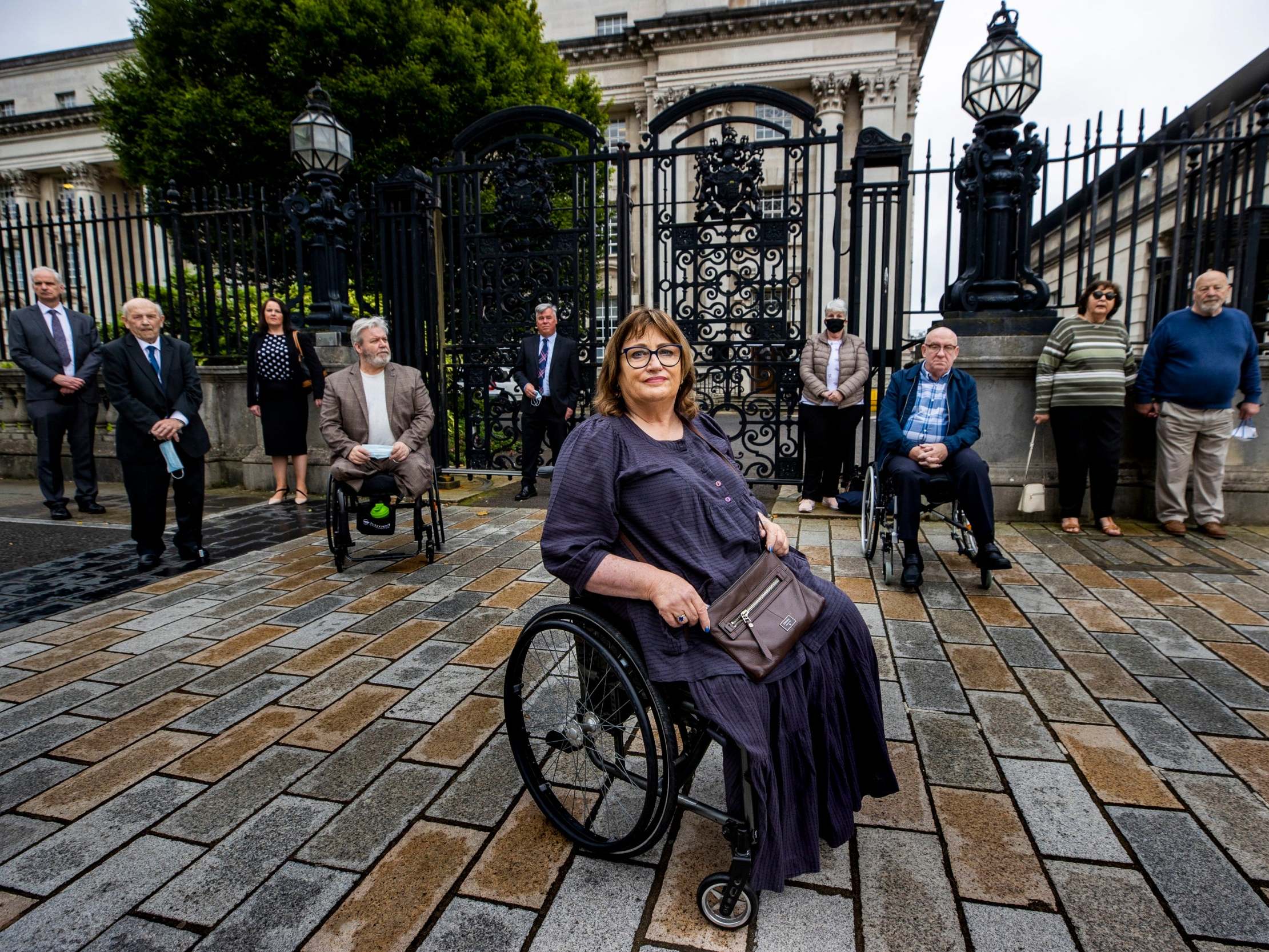Northern Ireland government 'unlawfully' delaying pension scheme for victims of Troubles
Applications for compensation should have opened in May

Your support helps us to tell the story
From reproductive rights to climate change to Big Tech, The Independent is on the ground when the story is developing. Whether it's investigating the financials of Elon Musk's pro-Trump PAC or producing our latest documentary, 'The A Word', which shines a light on the American women fighting for reproductive rights, we know how important it is to parse out the facts from the messaging.
At such a critical moment in US history, we need reporters on the ground. Your donation allows us to keep sending journalists to speak to both sides of the story.
The Independent is trusted by Americans across the entire political spectrum. And unlike many other quality news outlets, we choose not to lock Americans out of our reporting and analysis with paywalls. We believe quality journalism should be available to everyone, paid for by those who can afford it.
Your support makes all the difference.Sinn Fein has said it will nominate a Stormont department to progress a compensation scheme for injured victims of the Northern Ireland Troubles after a Belfast High Court judge ruled an ongoing delay was unlawful.
Justice McAlinden said on Friday The Executive Office (TEO) was under a “clear, unqualified and unconditional obligation” to designate a department to take forward the scheme by establishing a victims’ payment board by 29 May.
The judge said any argument to the contrary was “obtuse, absurd and irrational”.
He dismissed as “nonsense” a TEO contention that the court should not involve itself in what it claimed was a political dispute.
The judge said the TEO was deliberately stymieing the introduction of the scheme in a bid to pressurise Northern Ireland secretary Brandon Lewis to change the terms of the scheme.
He said TEO stance was “truly shocking” and said it demonstrated either a “wilful” disregard for the law or “abject ignorance” of it.
Justice McAlinden said deputy first minister Michelle O’Neill was the only minister in TEO taking this stance, highlighting that first minister Arlene Foster, having initially adopted the same position, had now made clear she was willing to designate a department immediately.
Responding to the judgment, Ms O’Neill said she had “no alternative” than to nominate a department, but insisted the scheme was devised by the UK and was “exclusionary, discriminatory and divisive”.
“Its policy intent was and remains to create a hierarchy of victims, and reinforce the British state narrative around the conflict,” she added.
“As joint head of government, I remain committed to delivering a scheme which is based on equality and open to everyone who was seriously physically and psychologically injured during the conflict.
“In light of the court ruling, therefore, I am left with no alternative other than to designate a department.
“However, that designation will require the executive to work together to secure the additional funds from Westminster for the cost of the scheme and get further clarity on eligibility and applications.”
Ms O’Neill accused Westminster of acting “in bad faith” and reneging on previous commitments to establish mechanisms to deal with the legacy of the Troubles.
She called for an Irish and UK government summit to progress outstanding matters.
Ms Foster tweeted: “This is a welcome judgement. Now time for Sinn Fein to prioritise innocent victims rather than bombers.”
The payment scheme, which should have been open to applications at the end of May, is in limbo because of a dispute between Sinn Fein and the government over eligibility criteria that are set to exclude anyone convicted of inflicting serious harm during the Troubles from accessing the support payments.
Sinn Fein claimed the scheme would be discriminatory and potentially exclude thousands of people from the republican community.
In a separate row, the Stormont administration and the UK government have been at odds over who should pay for the scheme.
The joint legal challenge was brought by Jennifer McNern, who lost both legs in a bombing, and Brian Turley, one of the “hooded men” who were arrested and interrogated by the British army in 1971.
They are challenging TEO’s failure to introduce the scheme, which would see victims paid up to £10,000 a year depending on the severity of their injury.
Reacting to the court victory, Ms McNern said: “I should never have had to take this case.
“I and other members of the WAVE Injured Group (a support group for victims) have been campaigning for too many years and until recently on our own for recognition and acknowledgement for the forgotten victims and survivors of the Troubles.
“We need our politicians to act on this now and implement the scheme.”
Mr Turley said: “How do the executive explain the profound unprofessionalism of their approach to victims?
“As a survivor of torture, I was left with long-term injuries as a result of the actions of the state.
“The delay in having to wait on my right to a pension can only be described as another form of torture.”
Mr Turley has also taken a case against Mr Lewis.
However, the judge found the Northern Ireland secretary had fulfilled his obligations and regulations and had delivered the basis for an “effective” and “workable” scheme.
Additional reporting by Press Association
Join our commenting forum
Join thought-provoking conversations, follow other Independent readers and see their replies
0Comments